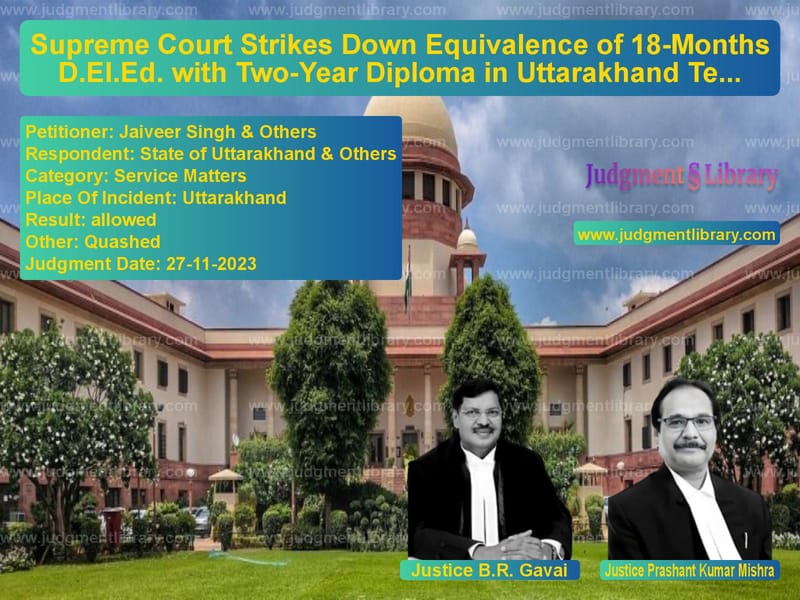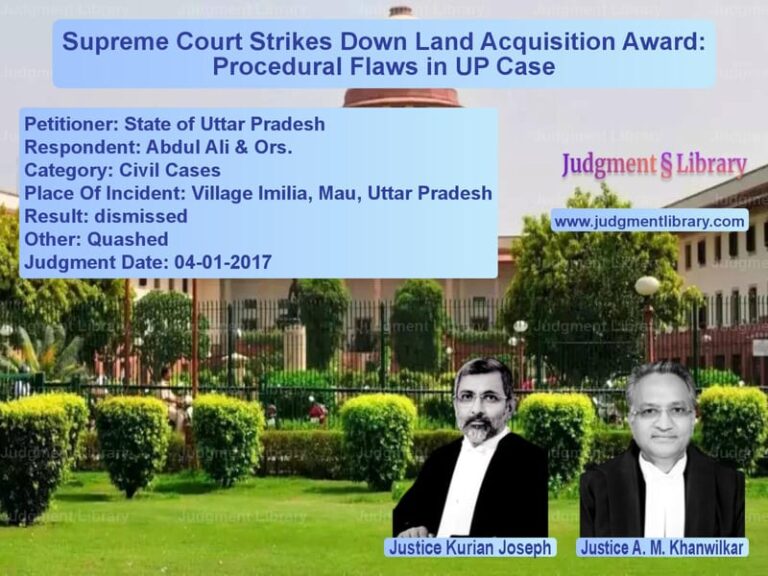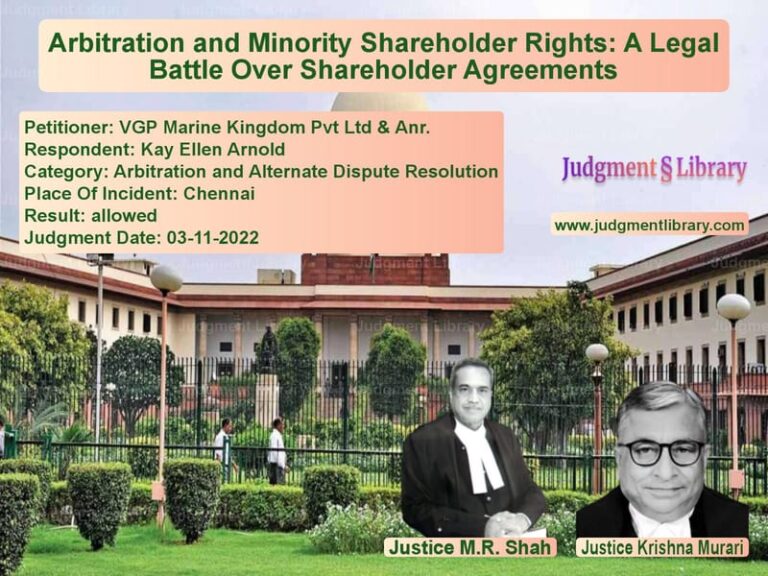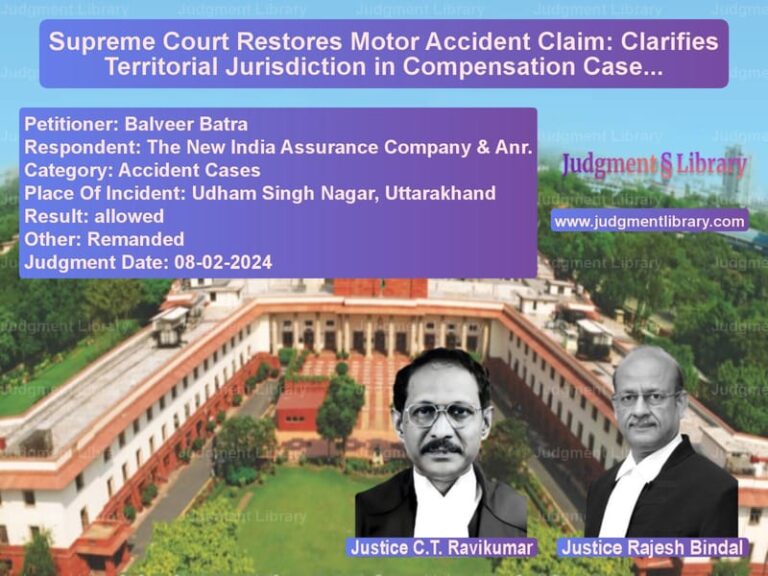Supreme Court Strikes Down Equivalence of 18-Months D.El.Ed. with Two-Year Diploma in Uttarakhand Teacher Recruitment
The Supreme Court of India recently ruled in Jaiveer Singh & Others v. The State of Uttarakhand & Others, overturning the Uttarakhand High Court’s decision that recognized an 18-month Diploma in Elementary Education (D.El.Ed.) through Open and Distance Learning (ODL) by the National Institute of Open Schooling (NIOS) as equivalent to a two-year D.El.Ed. for teacher recruitment.
Background of the Case
The case arose from a policy decision of the Uttarakhand government regarding the eligibility criteria for appointment to the post of Assistant Teacher (Primary) in the state’s elementary schools. The controversy began when the government initially allowed candidates with an 18-month D.El.Ed. diploma from NIOS to apply for the vacancies but later revoked this decision.
Following the revocation, several candidates who had obtained their D.El.Ed. through the 18-month ODL mode approached the High Court, arguing that their qualification was equivalent to the two-year diploma required under the Uttarakhand Government Elementary Education (Teacher) Service Rules, 2012. The High Court ruled in favor of these candidates, directing the state to consider their applications.
Legal Issues Examined
- Whether the 18-months D.El.Ed. through ODL was equivalent to the two-year D.El.Ed. diploma prescribed under statutory recruitment rules.
- Whether the state government was justified in revoking its initial decision allowing candidates with the 18-month qualification to apply.
- Whether the High Court exceeded its jurisdiction by equating the two courses despite NCTE’s (National Council for Teacher Education) stand on the issue.
Arguments by the Appellants (Candidates with Two-Year D.El.Ed.)
The appellants, candidates who had completed a full-time two-year D.El.Ed., argued:
- The NCTE’s 2014 regulations prescribed a two-year diploma as the minimum qualification for teacher recruitment.
- The 18-month program was a one-time exception for in-service untrained teachers under the 2017 amendment to the Right of Children to Free and Compulsory Education Act (RTE Act), and it was never meant for fresh recruitment.
- The state government was correct in revoking its earlier decision as it sought to adhere to established statutory qualifications.
Arguments by the Respondents (Candidates with 18-Months D.El.Ed.)
The respondents, who had completed the 18-month diploma from NIOS, contended:
- Since NCTE recognized their diploma for teacher training, the state should not have rejected their applications.
- The state government’s withdrawal of eligibility violated their right to equality and amounted to arbitrary discrimination.
- The High Court was correct in ruling that there was no substantial difference between the two courses.
Supreme Court’s Analysis
1. NCTE’s Stand on Minimum Qualifications
The Supreme Court reaffirmed that under Section 23 of the RTE Act, NCTE is the sole authority to prescribe qualifications for school teachers. The court noted:
“The minimum qualification prescribed by NCTE through its notifications of August 23, 2010, and July 29, 2011, specifically mandates a two-year Diploma in Elementary Education. Any deviation from this requirement requires a statutory modification.”
2. Special Provision for In-Service Teachers
The court highlighted that the 18-month diploma was introduced only for in-service teachers who were already employed but lacked proper training. The Supreme Court observed:
“The 18-month diploma was never intended to replace or be equivalent to the two-year D.El.Ed. for fresh recruits. It was a special provision for untrained teachers who needed to meet the eligibility criteria by March 31, 2019.”
3. High Court’s Overreach
The court criticized the High Court for effectively rewriting recruitment qualifications, stating:
“The High Court erred in holding that the 18-month diploma conducted by NIOS through ODL mode is equivalent to the two-year diploma prescribed by NCTE. Equivalence of qualifications is a technical decision best left to expert regulatory bodies.”
4. State’s Right to Prescribe Higher Standards
The Supreme Court held that the state government was within its rights to set a higher qualification requirement for teacher recruitment. The judgment emphasized:
“A state government may adopt a more stringent qualification criterion, but it cannot dilute the minimum qualification prescribed by NCTE. The decision to require a two-year diploma was consistent with educational standards and was well within the state’s prerogative.”
Final Judgment
The Supreme Court:
- Set aside the Uttarakhand High Court’s ruling.
- Reinstated the state government’s decision to disqualify candidates with an 18-month diploma from applying for teacher posts.
- Clarified that NCTE’s minimum qualifications must be strictly followed in teacher recruitment.
Conclusion
The ruling has major implications for teacher recruitment policies across India. Key takeaways include:
- Only the NCTE-prescribed qualifications are valid for teacher appointments.
- The 18-month diploma was an exceptional measure for existing teachers, not fresh applicants.
- High Courts cannot override regulatory bodies on technical educational matters.
- State governments have the right to set higher standards for teacher recruitment.
By striking down the High Court’s decision, the Supreme Court reinforced the importance of maintaining uniform educational qualifications and ensuring that teacher recruitment follows established statutory norms.
Petitioner Name: Jaiveer Singh & Others.Respondent Name: State of Uttarakhand & Others.Judgment By: Justice B.R. Gavai, Justice Prashant Kumar Mishra.Place Of Incident: Uttarakhand.Judgment Date: 27-11-2023.
Don’t miss out on the full details! Download the complete judgment in PDF format below and gain valuable insights instantly!
Download Judgment: jaiveer-singh-&-othe-vs-state-of-uttarakhand-supreme-court-of-india-judgment-dated-27-11-2023.pdf
Directly Download Judgment: Directly download this Judgment
See all petitions in Employment Disputes
See all petitions in Recruitment Policies
See all petitions in Public Sector Employees
See all petitions in Education Related Cases
See all petitions in Promotion Cases
See all petitions in Judgment by B R Gavai
See all petitions in Judgment by Prashant Kumar Mishra
See all petitions in allowed
See all petitions in Quashed
See all petitions in supreme court of India judgments November 2023
See all petitions in 2023 judgments
See all posts in Service Matters Category
See all allowed petitions in Service Matters Category
See all Dismissed petitions in Service Matters Category
See all partially allowed petitions in Service Matters Category







